Unit 8 When is your birthday 整单元课件+音频(共54张PPT)初中英语人教版七年级上册
文档属性
| 名称 | Unit 8 When is your birthday 整单元课件+音频(共54张PPT)初中英语人教版七年级上册 | 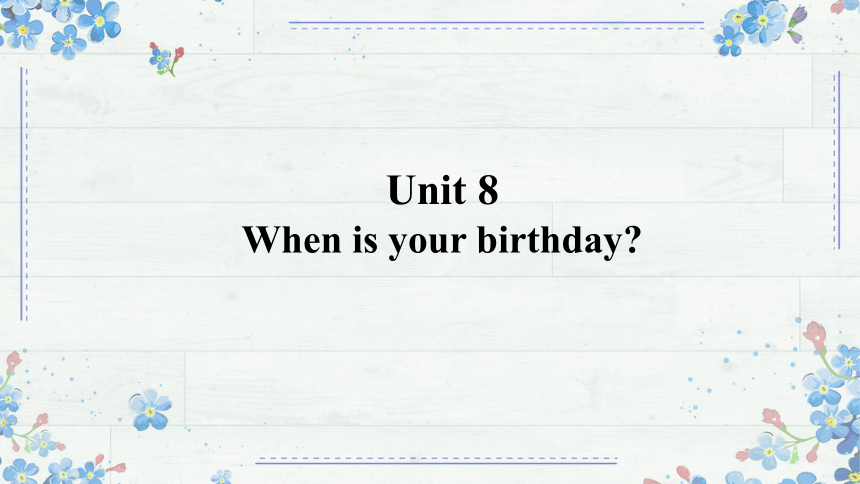 | |
| 格式 | pptx | ||
| 文件大小 | 13.6MB | ||
| 资源类型 | 教案 | ||
| 版本资源 | 人教新目标(Go for it)版 | ||
| 科目 | 英语 | ||
| 更新时间 | 2023-11-13 18:37:47 | ||
图片预览

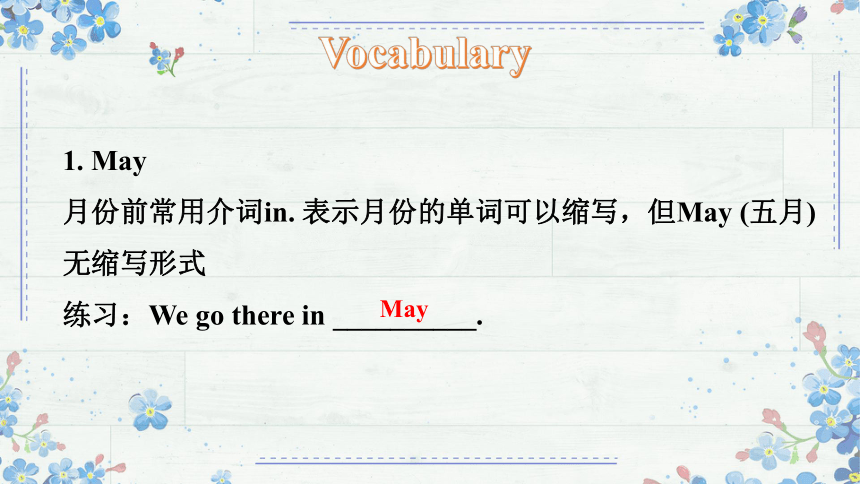
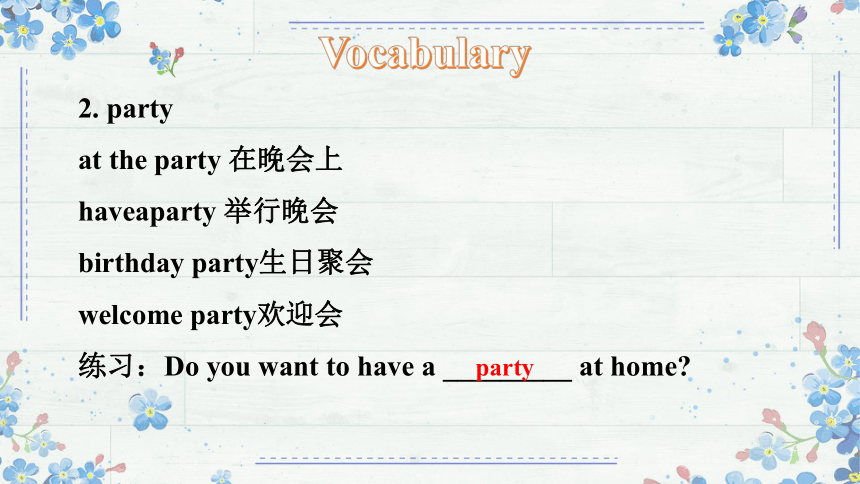
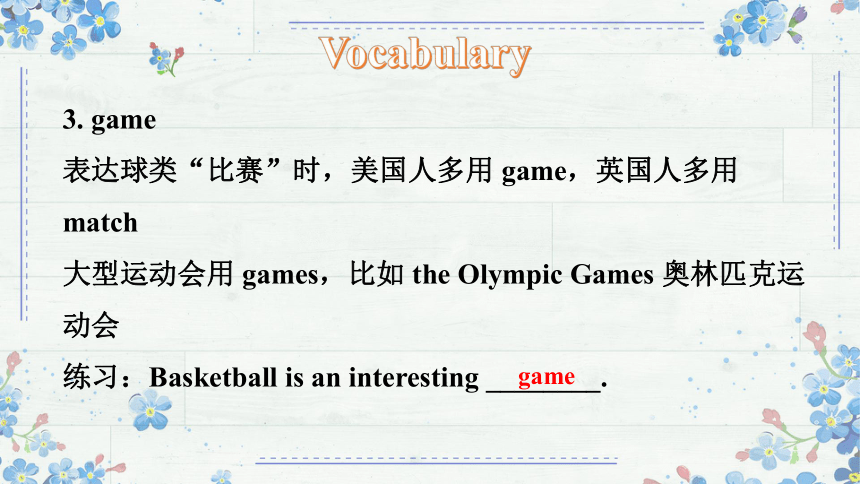


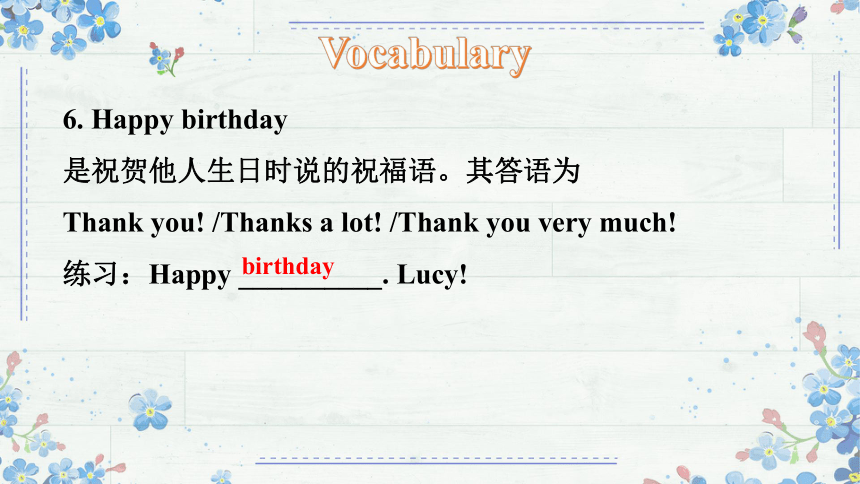
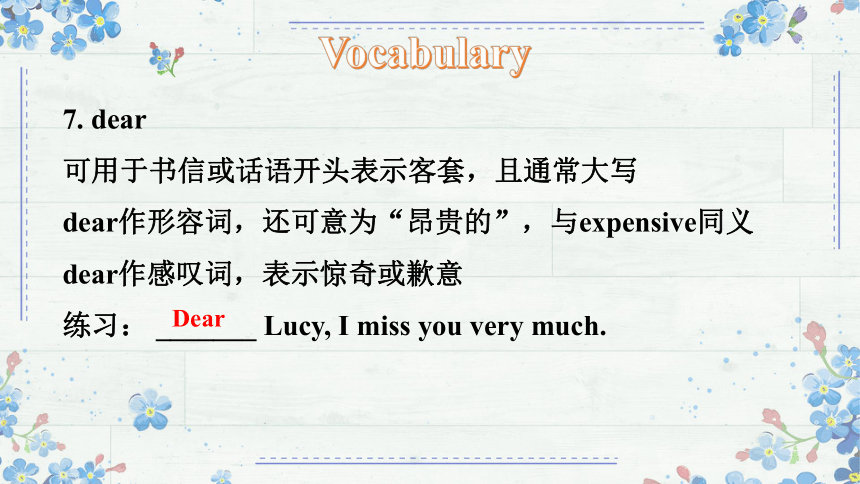
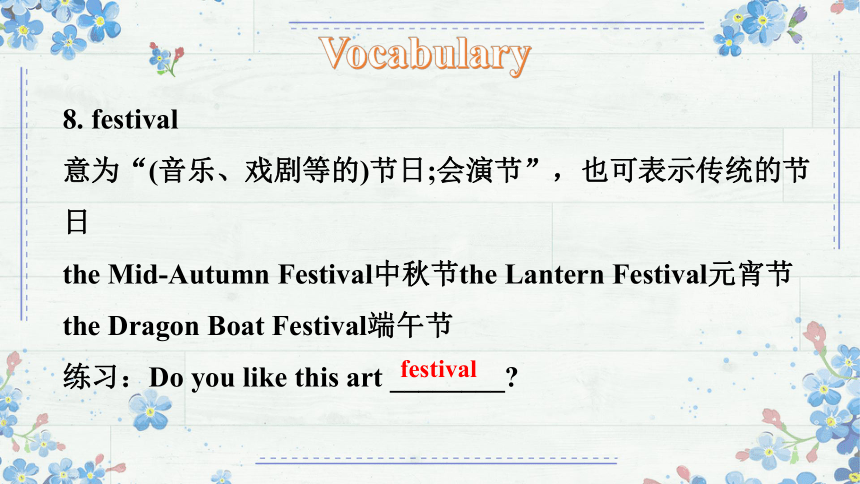
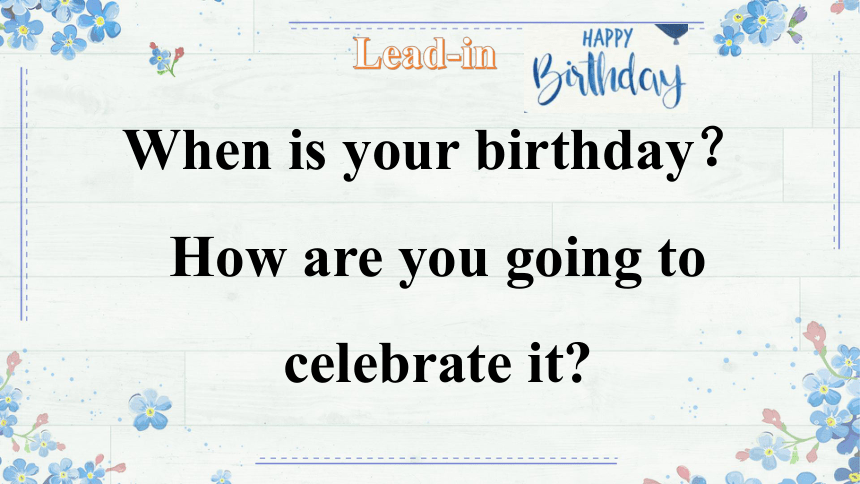
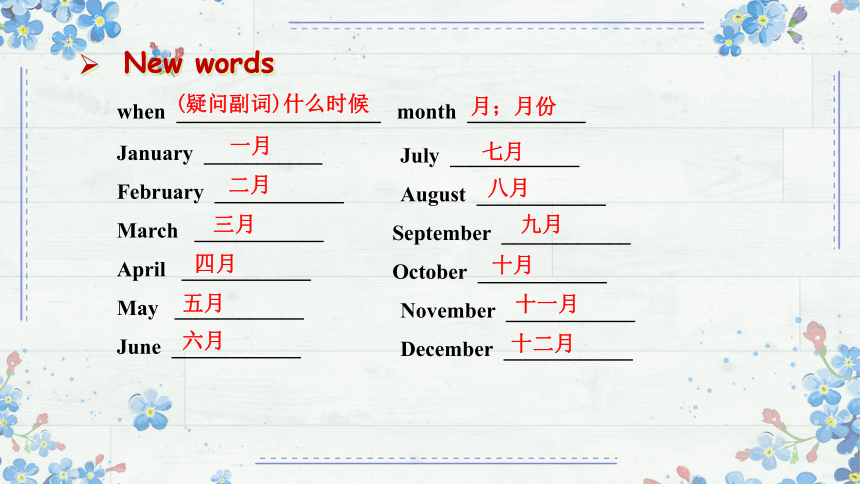
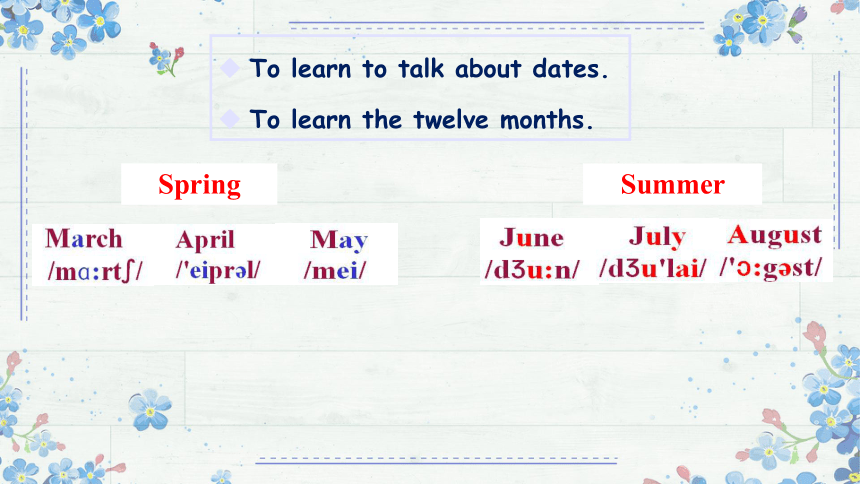
文档简介
(共54张PPT)
Unit 8
When is your birthday
Vocabulary
1. May
月份前常用介词in. 表示月份的单词可以缩写,但May (五月)无缩写形式
练习:We go there in __________.
May
Vocabulary
2. party
at the party 在晚会上
haveaparty 举行晚会
birthday party生日聚会
welcome party欢迎会
练习:Do you want to have a _________ at home
party
Vocabulary
3. game
表达球类“比赛”时,美国人多用 game,英国人多用 match
大型运动会用 games,比如 the Olympic Games 奥林匹克运动会
练习:Basketball is an interesting ________.
game
Vocabulary
4. old
old 是读音以元音音素开头的单词,修饰可数名词单数时,前面的不定冠词应用an。
当old 意为“老的,年长的”时,young (年轻的,幼小的) 是其反义词;当old
意为“旧的”时,new(新的) 是其反义词。
练习:He is very ______.
old
Vocabulary
5. happy
其反义词 unhappy,意为”不高兴的;不幸福的”
练习:She has a _______ family
happy
Vocabulary
6. Happy birthday
是祝贺他人生日时说的祝福语。其答语为
Thank you! /Thanks a lot! /Thank you very much!
练习:Happy __________. Lucy!
birthday
Vocabulary
7. dear
可用于书信或话语开头表示客套,且通常大写
dear作形容词,还可意为“昂贵的”,与expensive同义
dear作感叹词,表示惊奇或歉意
练习: _______ Lucy, I miss you very much.
Dear
Vocabulary
8. festival
意为“(音乐、戏剧等的)节日;会演节”,也可表示传统的节日
the Mid-Autumn Festival中秋节the Lantern Festival元宵节
the Dragon Boat Festival端午节
练习:Do you like this art ________
festival
Lead-in
When is your birthday?How are you going to celebrate it
New words
when ___________________ month ___________
January ___________
February ____________
March ____________
April ____________
May ____________
June ____________
July ____________
August ____________
September ____________
October ____________
November ____________
December ____________
(疑问副词)什么时候
月;月份
一月
二月
三月
四月
五月
六月
七月
八月
九月
十月
十一月
十二月
To learn to talk about dates.
To learn the twelve months.
Spring
Summer
Autumn
Winter
- What’s the date (日期) today (今天)
- It’s December 9th (ninth).
- What’s the date of your birth(出生)?
- It’s on January 6th.
A: When is your birthday
B: My birthday is on ______.
/ It’s on _______.
1a
Listen and repeat.
January
2. February
3. March
4. April
5. May
6. June
7. July
8. August
9. September
10. October
11. November
12. December
1b
Listen and number the conversations [1-3].
A: When is your birthday, Linda
B: My birthday is on May 2nd.
A: When is your birthday, Mary
B: It's on January 5th.
A: When is your birthday, Mike
B: My birthday is on June 3rd.
1
2
3
1c
Practice the conversations above with your partner. Then make your own conversations.
When is your birthday
My birthday is on May 2nd.
2a
Listen and repeat.
1st 2nd 3rd 4th 5th
6th 7th 8th 9th 10th
11th 12th 13th 14th 15th
16th 17th 18th 19th 20th
21st 22nd 23rd 24th 25th
26th 27th 28th 29th 30th
31st
2b
Listen and circle the numbers you hear in 2a.
1st 2nd 3rd 4th 5th 6th 7th 8th
9th 10th 11th 12th 13th 14th 15th 16th
17th 18th 19th 20th 21st 22nd 23rd 24th
25th 26th 27th 28th 29th 30th 31st
2c
Listen again. Match the names, months and dates.
Names Months Dates
Alice July 4th
Frank August 22nd
Eric January 5th
Jane September 17th
Read the conversation.
Mr. Smith: Now, Alice, how old are you
Alice: I'm thirteen.
Mr. Smith: When is your birthday
Alice: It's on September 5th, Mr. Smith.
Mr. Smith: Oh, OK. And how about Frank
Alice: Frank isn't here today, but his birthday in on July 4th.
Mr. Smith: Thank you, Alice. And Eric
Eric: My birthday is on January 17th.
Mr. Smith: On January 17th. OK. And Jane, when is her birthday
Eric: Her birthday is on August 22nd.
2d
Talk about the children's birthdays in 2c. Then ask your partner about the birthdays in his or her family.
A:When is Alice's birthday
B:Her birthday is on September 5th.
A:When is your father's birthday
B:His birthday is on _______.
2e
Role-play the conversation.
Bill: Hi, Alan. Happy birthday!
Alan: Thank you, Bill.
Bill: So, how old are you, Alan
Alan: I'm twelve. How old are you
Bill: I'm thirteen.
Alan: When is your birthday
Bill: My birthday is in August.
Alan: Well, do you want to come to my birthday party
Bill: Oh, yes. When is it
Alan: At three this afternoon.
Bill: OK, great. See you!
Read the conversation in 2e and answer the questions.
1. How old is Alan
She is ________________
2. How old is Bill
_____________________
3. When is Alan’s birthday party
______________________
twelve years old.
He is thirteen.
At three this afternoon.
1. —How old are you 你多大了?
—I’m fifteen. 我十五了。
how old意为“多大年纪;几岁”,常用于询问年龄。回答时可以直接用基数词表示,也可以用“基数词 + year (s) old”表示。
What’s ... age ”和“How old is / are ... ”意思相同,可互换。如:
What’s your age = How old are you 你多大了?
2. When is your birthday, Linda
My birthday is on May 2nd.
“When is one's birthday ”为询问某人生日的句型,其答语通常为“One's birthday is on+日期.”或“It's on+日期.”
May 2nd是日期的表达法。表达具体日期通常为“月份+序数词”,月份首字母必须大写。
英语中表示具体年、月、日的方式通常有两种“月+日+年”或“日+月+年”。年份要用逗号隔开。
e.g.2017年9月9日 September 9th, 2017或9th September, 2017
3.When is Alice's birthday
Alice's 是 Alice 的名词所有格形式,意为“艾丽斯的”,名词所有格表示人或物的所属关系,在句中作定语或表语。
's所有格的构成:
①一般情况下,在词尾加's。
Jim's friend 吉姆的朋友
②以s结尾的复数名词,在词尾加'。
the workers' leader 工人们的领导
③不以s结尾的复数名词,在词尾加's。
children's rooms 孩子们的房间
5.Happy birthday!
句中的happy用于表达祝愿“生日快乐!”。
回答时一般用 Thank you!
e.g.— Happy Birthday, Lucy! Lucy生日快乐!
— Thank you. 谢谢你。
Grammar Focus
1序数词的定义
表示事物顺序的数词叫作序数词。
2序数词的形式
(1)从第一到第三的序数词为独立的特殊形式,即 first,second,third
(2)从第四到第十九的序数词,一般是在相应的基数词的词尾加-th 构成。特别注
意:第五fifth,第八 eighth,第九 ninth,第十二 twelfth。
(3)从“第二十"”到“第九十”这些整十的序数词,其相应的基数词都是以y结
尾,序数词一般是把基数词词尾的y变成ie,再加-th,如: 第二十 twentieth,第
四+ fortieth等。
(4)表示“几十几”的两位数变序数词时,只将个位数改成序数词,如:第二十-
twenty-first第九十八ninety-eighth 等
3序数词的用法
(1)序数词前一般要加定冠词 the 表示顺序
例:The Yellow River is the second longest river in China.黄河是中国第二长河
(2)序数词常用作名词的定语,但当名词前已有形容词性物主代词等限定词时,则不再加 the。
例:her fourth birthday她的第四个生日
(3)表示英语中的分数时,分子用基数词,写在前面,分母用序数词,写在后面当分子超过1时,分母用的序数词后要加-S。
例: 1/3 one third 2/5 two fifths
(4)序数词前有时也可用不定冠词a/an,这时不再表示在具体范围内的”第几”而是表示在原有基础上的“又一个,另一个”
例:I think I must do it a second time.我想这件事我必须再做一次。(已做过一次)
(5)表示编号时,常把基数词放在名词后面来表示顺序,相当于“the+序数词+名词"
例: Lesson Five= the fifth lesson 第五课
名词所有格
英语中有些名词特别是表示有生命特征的事物的名词,可以加-S 表示所属关系,名词的这种形式称为名词所有格。
情况及规律:
A.单数名词后加-s构成所有格
B.复数名词以s或es结尾,后只加“-”构成所有格
C.以s结尾的人名,后只加“ ' ”构成所有格
D.复数名词不以s或es结尾,后加-s构成所有格
E.两人或多人共有同一件物品时,只在最后一个人后加-'s构成所有格
F.两人或多人分别所有的物品则在每个人后都要加-'s构成所有格
G.动、植物和无生命特征的名词的所有格,使用介词of来表示所属关系
H.“数量词/冠词/some/aw/no/few...+名词+of+名词所有格”表示双重所有格
1. March is the ________ month of a year.
A.first B.second C.third D.fourth
2. Today we have ______ classes, and the ______ class is math.
A. three;three B. first;three C. three;third D. third;three
3. Last Saturday was Peter’s ________ birthday. We had a nice birthday party.
A. twelve B. the twelfth C. the twelve D. twelfth
4. My pens are in my school bag, but ________ is on the desk.
A.Mike B.Mikes C.Mikes’ D.Mike’s
5. —What a clean and tidy room!
—Yes. It's ______ room.
A.Tina and Nina's B.Tina's and Nina
C.Tina and Nina D.Tina's and Nina's
C
C
D
D
A
What activities do you have in school this term
Sports Day
an art festival
an English test
School trip
1a
Match the pictures with the events.
1. __ English test 3. __ school trip
2. __ party 4. __ basketball game
d
c
b
a
1b
Listen and circle the events you hear in 1a.
1. __ English test 3. __ school trip
2. __ party 4. __ basketball game
1c
Listen again. Fill in John’s calendar.
SEPTEMBER
24
25
26
27
28
29
30
OCTOBER
1
2
3
4
5
6
7
Sally's birthday party
basketball
game
school
trip
school
trip
English
test
Read the conversation
John: Hey, Sally. Can I ask you some questions
Sally: Sure, John.
John: When is your birthday party
Sally: My birthday party is on October 5th.
John: OK, and when is the basketball game
Sally: The basketball game Oh, it’s on October 2nd.
John: Good. And, umm, how about the school trip
Sally: The school trip is on September 26th and 27th.
John: And when is the English test
Sally: Oh, that’s on Friday, September 29th.
John: OK. Thank you!
1d
Ask and answer questions about John’s calendar.
When is Sally’s birthday party
It’s on October 5th.
2a
Check (√) the activities you have at your school.
soccer game school trip School Day book sale
English Day art festival Sports Day party
2b
Read the school notice and list the activities and the dates.
Is this a busy term
Dear students,
We have some interesting and fun things for you this term. On September 21st, we have a school trip in the afternoon. October is a great month. On the 12th and the 15th, we have two ball games, soccer and volleyball. School Day is on October 22nd. Your parents can come to our school. Next month, we have an art festival. It’s on November 3rd. We have an English party on November 30th. And on December 3rd, we have a book sale in the school library.
This is a really busy term! Have a good time!
Dates Activities
September 21st
school trip
October 12th and 15th
ball games:soccer and volleyball
October 22nd
School Day
November 3rd
art festival
November 30th
English party
December 3rd
book sale
2c
Discuss the questions with your partner.
1. What activities from 2b do you like
2. What other activities do you like
Sports Day and English Day.
Going to the movies and visiting family.
3a
Complete the note with the words in the box.
my school game September like basketball
Dear Alan,
Do you ____ sports Do you have a _________ Please come to _________ next week. We have a basketball ______. It is on __________ 28th. See you there!
Guo Peng
like
basketball
my school
game
September
Writing
邀请某人参加某项活动的便条,其内容须包含四个问题,即:参加人的名字及爱好、活动名称及该活动举行的地点与时间。写作过程中可能用到的句型如下:
1. Do you like (have) …
你喜欢(有)……吗?
2. Please come to … next week/ this Friday. 请下周/这周五来……(某地).
3. We have a (an) … It’s on … 我们举行……(活动)。它在……(日期)。
4. On …, we have a(an) … in … 在……(日期), 我们在……(某地)举行……(活动)。
5. See you there!/ Have a good time!
再见!/祝你玩得高兴。
Writing
1. 先根据自己的实际情况回答四个提示问题。
2. 将四个答语连接起来,可以适当地加入连接词。
3. 按e-mail的写作格式, 先向对方进行问候, 或客套。结尾署名用Yours,XXX或者直接署名。
4. 再通读一遍自己的作品,看有没有错句式结构或语法错误。
Writing
Write your own note to a friend. Invite him / her to an activity in your school. Use the questions to help you.
What is your friend’s name
What does your friend like to do
What activity do you have in your school
When is the activity
1.School Day
day 通常表示“天;白天;一日”,作专有名词时,首字母应大写,表示“节;节日”。 此处 School Day 表示“学校开放日,学校庆祝日”。
2.We have some interesting and fun things for you this term.
动词have 有许多意义和用法,此处意为“举办;组织”。
e.g. We have a class meeting every week.
我们每星期都会召开一次班会。
3.This is a really busy term!
really副词,意为“真正地”。用于修饰动词或形容词,以加强语气。
busy 是形容词,意为“繁忙的;忙的”反义词是 free,意为“空闲的;有空的”
短语:be busy with sth. / be busy (in) doing sth.
e.g.He is busy cleaning the new house these days.
这几天他一直忙着打扫新房子。
4.Have a good time!
have a good time意为“玩得开心;过得愉快”。相当于have a great /nice /wonderful time 或 enjoy oneself /have fun。
单独使用时,表示祝愿。
e.g.They are having a good time in Beijing.
他们在北京玩得很开心。
Self Check
Complete the chart with the correct forms of the numbers.
one first six twelve
second seventh thirteenth
three eight twenty
fourth nine twenty-
first
five tenth thirty
two
third
four
fifth
sixth
seven
eighth
ninth
ten
twelfth
thirteen
twentieth
twenty-one
thirtieth
2
Write the dates for these holidays in China.
1. When is Children’s Day(儿童节)
It’s on ________.
2. When is National Day(国庆节)
It’s on __________.
3. When is Women’s Day(妇女节)
It’s on __________.
4. When is New Year’s Day(新年)
It’s on ___________.
June 1st
October 1st
March 8th
January 1st
Unit 8
When is your birthday
Vocabulary
1. May
月份前常用介词in. 表示月份的单词可以缩写,但May (五月)无缩写形式
练习:We go there in __________.
May
Vocabulary
2. party
at the party 在晚会上
haveaparty 举行晚会
birthday party生日聚会
welcome party欢迎会
练习:Do you want to have a _________ at home
party
Vocabulary
3. game
表达球类“比赛”时,美国人多用 game,英国人多用 match
大型运动会用 games,比如 the Olympic Games 奥林匹克运动会
练习:Basketball is an interesting ________.
game
Vocabulary
4. old
old 是读音以元音音素开头的单词,修饰可数名词单数时,前面的不定冠词应用an。
当old 意为“老的,年长的”时,young (年轻的,幼小的) 是其反义词;当old
意为“旧的”时,new(新的) 是其反义词。
练习:He is very ______.
old
Vocabulary
5. happy
其反义词 unhappy,意为”不高兴的;不幸福的”
练习:She has a _______ family
happy
Vocabulary
6. Happy birthday
是祝贺他人生日时说的祝福语。其答语为
Thank you! /Thanks a lot! /Thank you very much!
练习:Happy __________. Lucy!
birthday
Vocabulary
7. dear
可用于书信或话语开头表示客套,且通常大写
dear作形容词,还可意为“昂贵的”,与expensive同义
dear作感叹词,表示惊奇或歉意
练习: _______ Lucy, I miss you very much.
Dear
Vocabulary
8. festival
意为“(音乐、戏剧等的)节日;会演节”,也可表示传统的节日
the Mid-Autumn Festival中秋节the Lantern Festival元宵节
the Dragon Boat Festival端午节
练习:Do you like this art ________
festival
Lead-in
When is your birthday?How are you going to celebrate it
New words
when ___________________ month ___________
January ___________
February ____________
March ____________
April ____________
May ____________
June ____________
July ____________
August ____________
September ____________
October ____________
November ____________
December ____________
(疑问副词)什么时候
月;月份
一月
二月
三月
四月
五月
六月
七月
八月
九月
十月
十一月
十二月
To learn to talk about dates.
To learn the twelve months.
Spring
Summer
Autumn
Winter
- What’s the date (日期) today (今天)
- It’s December 9th (ninth).
- What’s the date of your birth(出生)?
- It’s on January 6th.
A: When is your birthday
B: My birthday is on ______.
/ It’s on _______.
1a
Listen and repeat.
January
2. February
3. March
4. April
5. May
6. June
7. July
8. August
9. September
10. October
11. November
12. December
1b
Listen and number the conversations [1-3].
A: When is your birthday, Linda
B: My birthday is on May 2nd.
A: When is your birthday, Mary
B: It's on January 5th.
A: When is your birthday, Mike
B: My birthday is on June 3rd.
1
2
3
1c
Practice the conversations above with your partner. Then make your own conversations.
When is your birthday
My birthday is on May 2nd.
2a
Listen and repeat.
1st 2nd 3rd 4th 5th
6th 7th 8th 9th 10th
11th 12th 13th 14th 15th
16th 17th 18th 19th 20th
21st 22nd 23rd 24th 25th
26th 27th 28th 29th 30th
31st
2b
Listen and circle the numbers you hear in 2a.
1st 2nd 3rd 4th 5th 6th 7th 8th
9th 10th 11th 12th 13th 14th 15th 16th
17th 18th 19th 20th 21st 22nd 23rd 24th
25th 26th 27th 28th 29th 30th 31st
2c
Listen again. Match the names, months and dates.
Names Months Dates
Alice July 4th
Frank August 22nd
Eric January 5th
Jane September 17th
Read the conversation.
Mr. Smith: Now, Alice, how old are you
Alice: I'm thirteen.
Mr. Smith: When is your birthday
Alice: It's on September 5th, Mr. Smith.
Mr. Smith: Oh, OK. And how about Frank
Alice: Frank isn't here today, but his birthday in on July 4th.
Mr. Smith: Thank you, Alice. And Eric
Eric: My birthday is on January 17th.
Mr. Smith: On January 17th. OK. And Jane, when is her birthday
Eric: Her birthday is on August 22nd.
2d
Talk about the children's birthdays in 2c. Then ask your partner about the birthdays in his or her family.
A:When is Alice's birthday
B:Her birthday is on September 5th.
A:When is your father's birthday
B:His birthday is on _______.
2e
Role-play the conversation.
Bill: Hi, Alan. Happy birthday!
Alan: Thank you, Bill.
Bill: So, how old are you, Alan
Alan: I'm twelve. How old are you
Bill: I'm thirteen.
Alan: When is your birthday
Bill: My birthday is in August.
Alan: Well, do you want to come to my birthday party
Bill: Oh, yes. When is it
Alan: At three this afternoon.
Bill: OK, great. See you!
Read the conversation in 2e and answer the questions.
1. How old is Alan
She is ________________
2. How old is Bill
_____________________
3. When is Alan’s birthday party
______________________
twelve years old.
He is thirteen.
At three this afternoon.
1. —How old are you 你多大了?
—I’m fifteen. 我十五了。
how old意为“多大年纪;几岁”,常用于询问年龄。回答时可以直接用基数词表示,也可以用“基数词 + year (s) old”表示。
What’s ... age ”和“How old is / are ... ”意思相同,可互换。如:
What’s your age = How old are you 你多大了?
2. When is your birthday, Linda
My birthday is on May 2nd.
“When is one's birthday ”为询问某人生日的句型,其答语通常为“One's birthday is on+日期.”或“It's on+日期.”
May 2nd是日期的表达法。表达具体日期通常为“月份+序数词”,月份首字母必须大写。
英语中表示具体年、月、日的方式通常有两种“月+日+年”或“日+月+年”。年份要用逗号隔开。
e.g.2017年9月9日 September 9th, 2017或9th September, 2017
3.When is Alice's birthday
Alice's 是 Alice 的名词所有格形式,意为“艾丽斯的”,名词所有格表示人或物的所属关系,在句中作定语或表语。
's所有格的构成:
①一般情况下,在词尾加's。
Jim's friend 吉姆的朋友
②以s结尾的复数名词,在词尾加'。
the workers' leader 工人们的领导
③不以s结尾的复数名词,在词尾加's。
children's rooms 孩子们的房间
5.Happy birthday!
句中的happy用于表达祝愿“生日快乐!”。
回答时一般用 Thank you!
e.g.— Happy Birthday, Lucy! Lucy生日快乐!
— Thank you. 谢谢你。
Grammar Focus
1序数词的定义
表示事物顺序的数词叫作序数词。
2序数词的形式
(1)从第一到第三的序数词为独立的特殊形式,即 first,second,third
(2)从第四到第十九的序数词,一般是在相应的基数词的词尾加-th 构成。特别注
意:第五fifth,第八 eighth,第九 ninth,第十二 twelfth。
(3)从“第二十"”到“第九十”这些整十的序数词,其相应的基数词都是以y结
尾,序数词一般是把基数词词尾的y变成ie,再加-th,如: 第二十 twentieth,第
四+ fortieth等。
(4)表示“几十几”的两位数变序数词时,只将个位数改成序数词,如:第二十-
twenty-first第九十八ninety-eighth 等
3序数词的用法
(1)序数词前一般要加定冠词 the 表示顺序
例:The Yellow River is the second longest river in China.黄河是中国第二长河
(2)序数词常用作名词的定语,但当名词前已有形容词性物主代词等限定词时,则不再加 the。
例:her fourth birthday她的第四个生日
(3)表示英语中的分数时,分子用基数词,写在前面,分母用序数词,写在后面当分子超过1时,分母用的序数词后要加-S。
例: 1/3 one third 2/5 two fifths
(4)序数词前有时也可用不定冠词a/an,这时不再表示在具体范围内的”第几”而是表示在原有基础上的“又一个,另一个”
例:I think I must do it a second time.我想这件事我必须再做一次。(已做过一次)
(5)表示编号时,常把基数词放在名词后面来表示顺序,相当于“the+序数词+名词"
例: Lesson Five= the fifth lesson 第五课
名词所有格
英语中有些名词特别是表示有生命特征的事物的名词,可以加-S 表示所属关系,名词的这种形式称为名词所有格。
情况及规律:
A.单数名词后加-s构成所有格
B.复数名词以s或es结尾,后只加“-”构成所有格
C.以s结尾的人名,后只加“ ' ”构成所有格
D.复数名词不以s或es结尾,后加-s构成所有格
E.两人或多人共有同一件物品时,只在最后一个人后加-'s构成所有格
F.两人或多人分别所有的物品则在每个人后都要加-'s构成所有格
G.动、植物和无生命特征的名词的所有格,使用介词of来表示所属关系
H.“数量词/冠词/some/aw/no/few...+名词+of+名词所有格”表示双重所有格
1. March is the ________ month of a year.
A.first B.second C.third D.fourth
2. Today we have ______ classes, and the ______ class is math.
A. three;three B. first;three C. three;third D. third;three
3. Last Saturday was Peter’s ________ birthday. We had a nice birthday party.
A. twelve B. the twelfth C. the twelve D. twelfth
4. My pens are in my school bag, but ________ is on the desk.
A.Mike B.Mikes C.Mikes’ D.Mike’s
5. —What a clean and tidy room!
—Yes. It's ______ room.
A.Tina and Nina's B.Tina's and Nina
C.Tina and Nina D.Tina's and Nina's
C
C
D
D
A
What activities do you have in school this term
Sports Day
an art festival
an English test
School trip
1a
Match the pictures with the events.
1. __ English test 3. __ school trip
2. __ party 4. __ basketball game
d
c
b
a
1b
Listen and circle the events you hear in 1a.
1. __ English test 3. __ school trip
2. __ party 4. __ basketball game
1c
Listen again. Fill in John’s calendar.
SEPTEMBER
24
25
26
27
28
29
30
OCTOBER
1
2
3
4
5
6
7
Sally's birthday party
basketball
game
school
trip
school
trip
English
test
Read the conversation
John: Hey, Sally. Can I ask you some questions
Sally: Sure, John.
John: When is your birthday party
Sally: My birthday party is on October 5th.
John: OK, and when is the basketball game
Sally: The basketball game Oh, it’s on October 2nd.
John: Good. And, umm, how about the school trip
Sally: The school trip is on September 26th and 27th.
John: And when is the English test
Sally: Oh, that’s on Friday, September 29th.
John: OK. Thank you!
1d
Ask and answer questions about John’s calendar.
When is Sally’s birthday party
It’s on October 5th.
2a
Check (√) the activities you have at your school.
soccer game school trip School Day book sale
English Day art festival Sports Day party
2b
Read the school notice and list the activities and the dates.
Is this a busy term
Dear students,
We have some interesting and fun things for you this term. On September 21st, we have a school trip in the afternoon. October is a great month. On the 12th and the 15th, we have two ball games, soccer and volleyball. School Day is on October 22nd. Your parents can come to our school. Next month, we have an art festival. It’s on November 3rd. We have an English party on November 30th. And on December 3rd, we have a book sale in the school library.
This is a really busy term! Have a good time!
Dates Activities
September 21st
school trip
October 12th and 15th
ball games:soccer and volleyball
October 22nd
School Day
November 3rd
art festival
November 30th
English party
December 3rd
book sale
2c
Discuss the questions with your partner.
1. What activities from 2b do you like
2. What other activities do you like
Sports Day and English Day.
Going to the movies and visiting family.
3a
Complete the note with the words in the box.
my school game September like basketball
Dear Alan,
Do you ____ sports Do you have a _________ Please come to _________ next week. We have a basketball ______. It is on __________ 28th. See you there!
Guo Peng
like
basketball
my school
game
September
Writing
邀请某人参加某项活动的便条,其内容须包含四个问题,即:参加人的名字及爱好、活动名称及该活动举行的地点与时间。写作过程中可能用到的句型如下:
1. Do you like (have) …
你喜欢(有)……吗?
2. Please come to … next week/ this Friday. 请下周/这周五来……(某地).
3. We have a (an) … It’s on … 我们举行……(活动)。它在……(日期)。
4. On …, we have a(an) … in … 在……(日期), 我们在……(某地)举行……(活动)。
5. See you there!/ Have a good time!
再见!/祝你玩得高兴。
Writing
1. 先根据自己的实际情况回答四个提示问题。
2. 将四个答语连接起来,可以适当地加入连接词。
3. 按e-mail的写作格式, 先向对方进行问候, 或客套。结尾署名用Yours,XXX或者直接署名。
4. 再通读一遍自己的作品,看有没有错句式结构或语法错误。
Writing
Write your own note to a friend. Invite him / her to an activity in your school. Use the questions to help you.
What is your friend’s name
What does your friend like to do
What activity do you have in your school
When is the activity
1.School Day
day 通常表示“天;白天;一日”,作专有名词时,首字母应大写,表示“节;节日”。 此处 School Day 表示“学校开放日,学校庆祝日”。
2.We have some interesting and fun things for you this term.
动词have 有许多意义和用法,此处意为“举办;组织”。
e.g. We have a class meeting every week.
我们每星期都会召开一次班会。
3.This is a really busy term!
really副词,意为“真正地”。用于修饰动词或形容词,以加强语气。
busy 是形容词,意为“繁忙的;忙的”反义词是 free,意为“空闲的;有空的”
短语:be busy with sth. / be busy (in) doing sth.
e.g.He is busy cleaning the new house these days.
这几天他一直忙着打扫新房子。
4.Have a good time!
have a good time意为“玩得开心;过得愉快”。相当于have a great /nice /wonderful time 或 enjoy oneself /have fun。
单独使用时,表示祝愿。
e.g.They are having a good time in Beijing.
他们在北京玩得很开心。
Self Check
Complete the chart with the correct forms of the numbers.
one first six twelve
second seventh thirteenth
three eight twenty
fourth nine twenty-
first
five tenth thirty
two
third
four
fifth
sixth
seven
eighth
ninth
ten
twelfth
thirteen
twentieth
twenty-one
thirtieth
2
Write the dates for these holidays in China.
1. When is Children’s Day(儿童节)
It’s on ________.
2. When is National Day(国庆节)
It’s on __________.
3. When is Women’s Day(妇女节)
It’s on __________.
4. When is New Year’s Day(新年)
It’s on ___________.
June 1st
October 1st
March 8th
January 1st
同课章节目录
- starters 预备篇(2012秋审查)
- Unit 1 Good morning !
- Unit 2 What’s this in English?
- Unit 3 What color is it ?
- Unit 1 My name's Gina.
- Section A
- Section B
- Unit 2 This is my sister.
- Section A
- Section B
- Unit 3 Is this your pencil?
- Section A
- Section B
- Unit 4 Where's my schoolbag?
- Section A
- Section B
- Unit 5 Do you have a soccer ball?
- Section A
- Section B
- Unit 6 Do you like bananas?
- Section A
- Section B
- Unit 7 How much are these socks?
- Section A
- Section B
- Unit 8 When is your birthday?
- Section A
- Section B
- Unit 9 My favorite subject is science.
- Section A
- Section B
